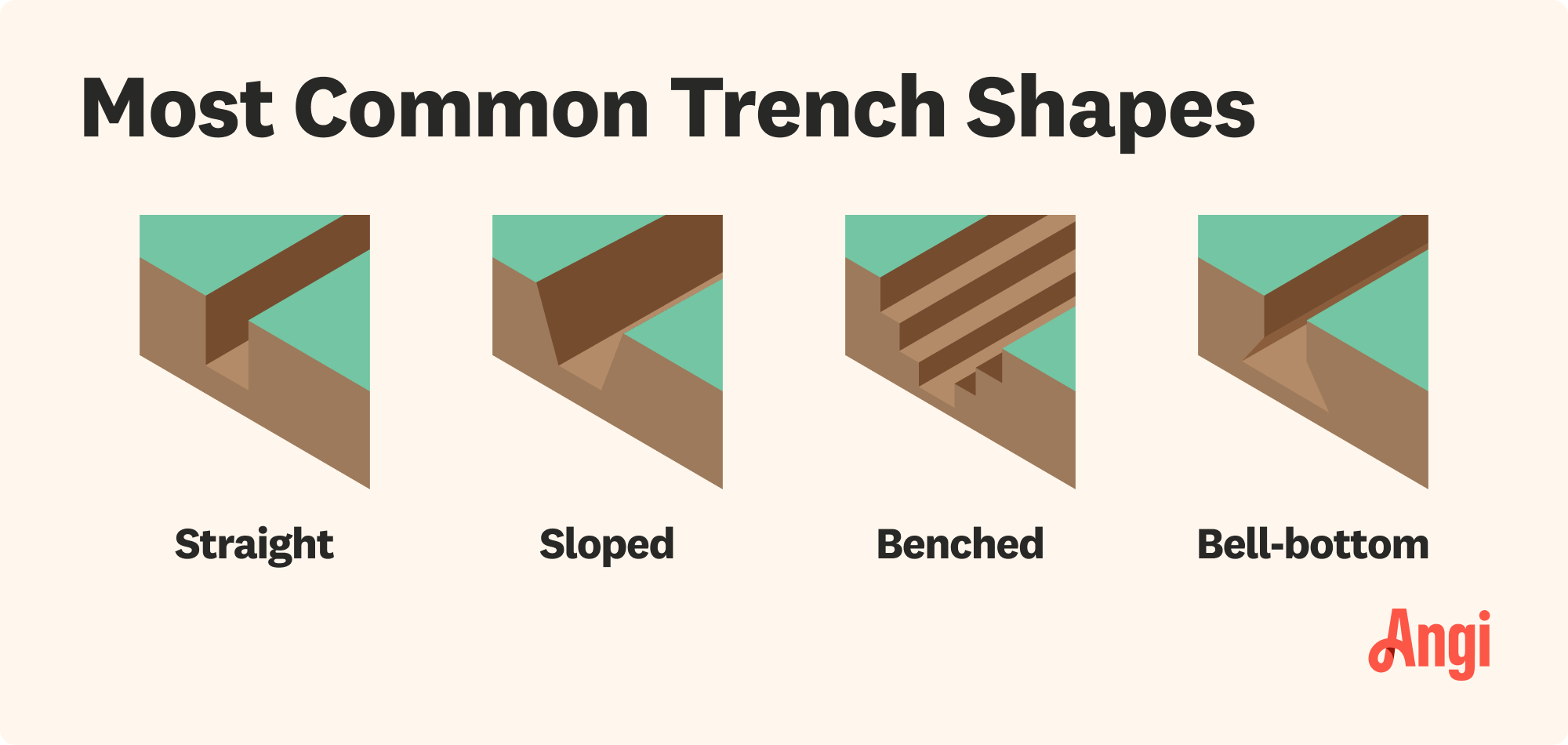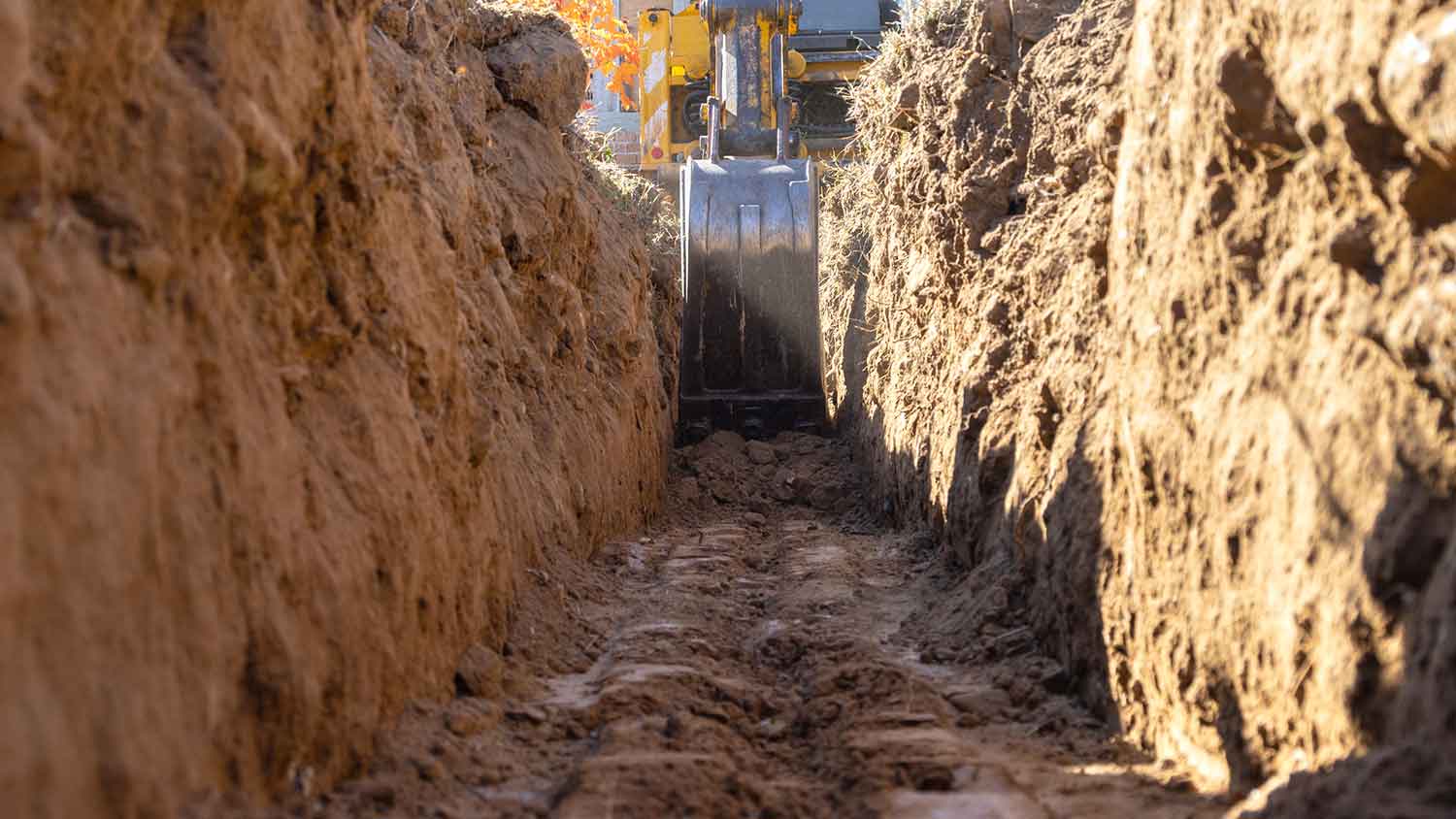
Time to get rid of that old chipped and crumbling walkway? Concrete removal costs can add up, but you have options to simplify the process. Learn more here.
It’s a dirty job, but if you need to lay plumbing, someone’s got to do it


A trench is a human-made excavation in the ground that’s deeper than it is wide.
Trenches are used to hold plumbing pipes, sewer lines, and electrical cables.
Trenching can be a dangerous job that requires the use of heavy machinery, so it’s best left to professionals.
Some systems, like plumbing, tend to work best underground, and that’s when it’s time to turn to trenching. Trenching is the process of excavating an opening in the ground that’s deeper than it is wide, often in order to lay plumbing pipelines, electrical cables, and other home support systems that need to be kept out of the way.
The Occupational Safety and Health Administration (OSHA) helpfully defines a trench as a “narrow excavation” whose depth is greater than its width, which should be no more than 15 feet across. There’s no specification for how long a trench should be. (An excavation, for its part, is “any [human]-made cut, cavity, trench, or depression in the Earth’s surface formed by earth removal” as defined by OSHA.) For instance, a trench is different from a ditch, which is different from a hole.
In short, a trench is a relatively narrow but deep and long hole in the ground in which pipes, cables, or sewer lines are often laid. Trenches are dug using heavy machinery like trenching machines, excavators, and diggers, some of which can be rented by DIYers.
“When you're having a demolition or excavation project done in or around your home, here are a few tips to follow: Don’t touch it. Don’t turn off the machines. Don’t try to peek inside containment units. Don’t try to help. This is for your safety.”
— Josh Rudin, Owner of ASAP Restoration LLC, Tempe, Arizona

While all trenches are deeper than they are wide, they’re not all the same. Different types of trenches are defined by their shapes, including:
Straight trenches, with walls perpendicular to the floor of the trench
Sloped trenches, whose walls slope up from a narrower trench floor to a wider opening
Benched trenches, whose walls resemble stairs down to the trench floor
Bell-bottom pier hole trenches, where the floor of the trench is wider than the surface opening
Each trench has its own best use cases, though some, like bell-bottom pier hole trenches, are more difficult to safely dig than others.

Trenching is a dangerous project filled with potential safety hazards, including cave-ins, falling loads or debris, exposure to hazardous fumes, and fall accidents. It’s also important to know where existing utility lines lay on your property before you begin to dig. Otherwise, you risk cutting into wires or pipes (not to mention roots and other natural structures).
Any trench that’s deeper than 5 feet will require protective systems to be installed to avoid a cave-in. Some of these protective systems include:
Sloping: Simply sloping the walls of a trench can help reduce the risk of a cave-in.
Shoring: Using physical supports made of wood or metal to shore up the trench walls can increase the trench’s structural integrity.
Shielding: Installing a tool known as a trench shield or trench box can protect contractors who may need to work at the bottom of the trench.
While very small trenching projects are DIYable under the right circumstances, you should leave larger projects to a local excavation company. They’ll already have all the necessary tools and equipment to get the job done—not to mention the safety know-how to do so without anyone getting hurt.
From average costs to expert advice, get all the answers you need to get your job done.

Time to get rid of that old chipped and crumbling walkway? Concrete removal costs can add up, but you have options to simplify the process. Learn more here.

You can't have an in-ground pool without digging into the ground. How much does pool excavation cost, and can you take it on yourself? Our guide explains.

Preparing for a big excavation project in your yard? Find out excavator rental prices by type, project size, and more to budget for your project.

Who can dig a trench for you? You can rent trenching equipment for a simple job, but a local excavation company can help with tough ones. Here's how.

If you want to hire someone to dig a trench, choose a local excavation company. Learn why you should hire a pro for your trench and what it will cost.

Demolishing a house is a major project that’s best completed by professional demolition services. Read more about why and who to hire.